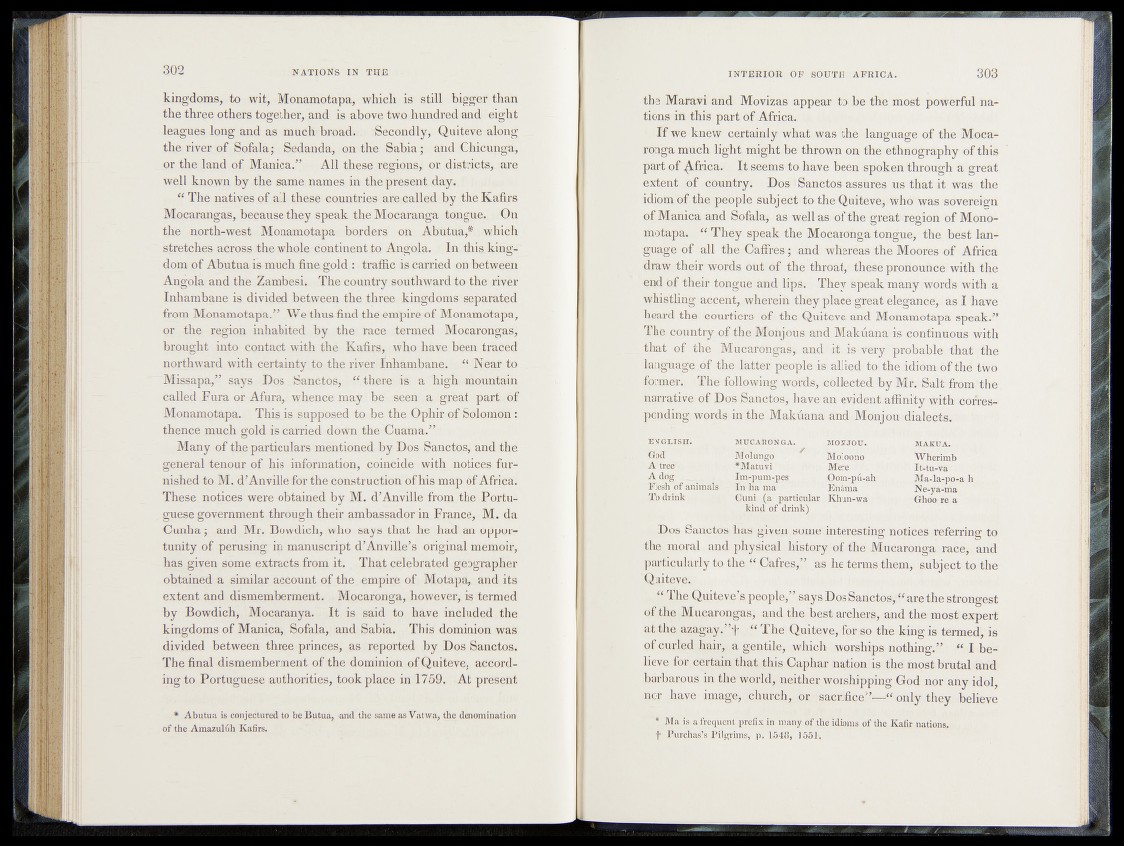
kingdoms, to wit, Monamotapa, which is still bigger than
the three others together, and is above two hundred and 'eight
leagues long and as muehrbroad; .^Secondly, Quiteve (along
the river of Sofala; Sedanda, on the Sabia ; and Chicupga,
or the land of Manila.” All these régions, or districts, are
well known by the same names in the present day. !
s “ The natives of alL these countries are^called by the Kafirs
Moearangas, because they speak the Mocaranga tongue.. On
the north-west Monamotapa borders on Abutua,* which
stretches across the whOle continentto Angola. In this king-"
dom of Abutua is much finegold : traffic is Carried on between
Angola and the Zambesi* The country southward to the river
Inhambane is divided between the three kingdomscSeparated
from Monamotapa.” We thus find the empire of Monamotapa,
or the region inhabited by the race termed Mocarongas)
brought into contact with thé Kafirs, who have been traefed
northward with certainty)tO the river Inhambane. , &s(Noar to
Missapa/’ says Dos .Sanctos, “ fc a high,--mountain
called Fura or Afera, whence may be . seen::a great parti.of
Monamotapa. This is supposed to die the Ophir ofi?Sflto®û©n :
thence much gold is carried down the Cuanaa.” ;
Many of the particulars mentioned by Dos Sanctqs, and thé
general tenour of his information, coincide with notLces furnished
to M. d’Anville for the construction of his map of Africa.
These notices were obtained by M. d’Anville from the Portuguese
government through their ambassador in France, M. da
Cunha ; and Mr. Bowdich, who says that he had an opportunity
of perusing in manuscript d’Anville’s original memoir,
has given some extracts from it. That celebrated geographer
obtained a similar account of the empire of Motàpa, and its
extent and dismemberment*Mocaronga, however, is termed
by Bowdich, Mocaranya. It is said to have included the
kingdoms of Manica, Sofala, and Sabia. This dominion was
divided between three princes, as reported by Dos Sanctos.
The final dismemberment of the dominion of Quiteve, according
to Portuguese authorities, took place in 1759. At present
* Abutua is conjectured to be Butua, and tbe same as Vatwa, the denomination
of the Amazulûh Kafirs.
the Maravi and Movizas appear to be the most powerful nations
in this part of Africa.
I f We "knew* G^rtaiHlptv^hat.;was the -language of the Moea-
foriga mucbdtgit might be thrown on the ethnography of this
part of ^Lfrica. seeHas^| have beej^tsjjoken through a great
extent ‘of country; Dos^Sanctos assures ms that it was: the
idiom of th^>eople ^ubj^^to j$je Quiteve,■'Vfho was sovereign
of Manica and Sofala) as well^asr of the great -region of Mono-;
motapa. “ They, spepk the Mocardfiga^tongue, the best language
of.,all the Gaffre^'j'^and wherea&jtbeMoortes^of Africa
draw their words outlof the throaty these proriouhce with the
end of their tongue and lips. They^.eak'many ■words- with a
whistling accent, wherein theyplace grea-t|Megan®e^ as I have
heard the *courtfers'-<j>f the . Quiteve and Mohamotapar speak. ”
Thercenntrj oj|>the Mbnjous and .Makuanads.continuous with
that of thfpMucarbhgasy and m^vecy’.probable that\;ihe
language,^6f the latter people is- allied %>] the idiouubf the two
former.' The' followings words^ollected. by Mr. 'Salt from tlite'
.narrative of Dos .Sanctos, have an evident affinity'with co/res-
ponding words in the Makuiana and'Monjoudialeets.
ENGLISH.
'God'
A ‘ tree'» ■.
A dog
Flesh of animals
.To drink t ,
MUCApoNGA.
M olungo f
“Matuyi '
Tmrpuin-pes
In ha ma '
©uni .(a particular
. kind of drink)
MOEJOTT.
Molôono ■
Mere
Oom-pti-ah
Enâma
Klmn-wa
31 M V A,
Wherimb '
It-tu-va
J^ta-la^po-a h
N^-ya-ma
Ghoo re a
Dos Sanctos<has given some.interesting notices referring to
the moral and physical .history-of tbe Mucaronga race, and
particularly to the “ Cafres,” as he terms them, subject to the
Quiteve.
“ The Quiteve’s people,” says Dos Sarictos, “ are the strongest
of the Mucarongas, and the best archers, and the most-expert
at the azagay.”T (< The Quiteve, for so the king is termed) is
of curled hair, a gentile, which ’ worships nothing*” “ I believe’for
certain that this Caphar nation is the inpst brutal and
barbarous in the world, neither worshipping God nor any idol,
nor have image* church, or sacrifice|^“ only they believe
* Ma i§ a frequent prefix in many of the idioms of the Kafir nations.
+ Purchas’s Pilgrims, p. 1548, ]5«>k •